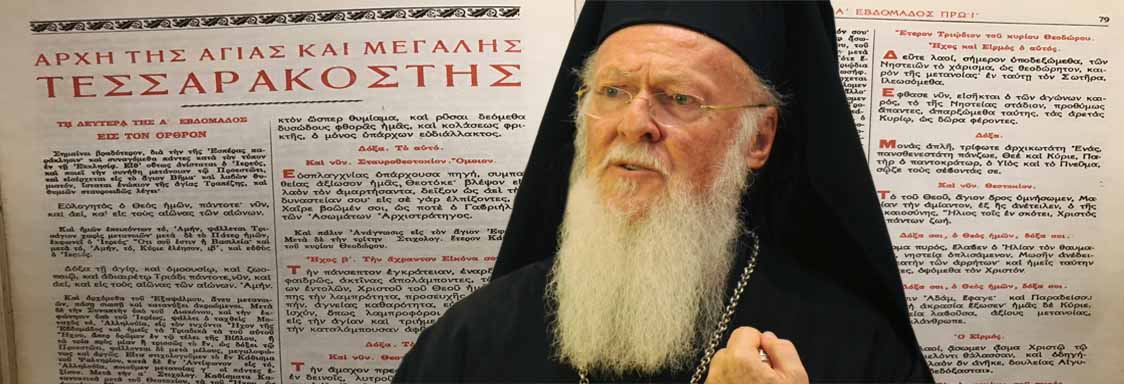
+ BARTHOLOMEW
By God’s mercy Archbishop of Constantinople-New Rome
and Ecumenical Patriarch
To the Plenitude of the Church
May the Grace and Peace of our Lord and Savior Jesus Christ be with you
Together with our Prayer, Blessing and Forgiveness
* * *
With the grace of God, the giver of all gifts, we have once again arrived at Holy and Great Lent, the arena of ascetical struggle, in order to purify ourselves with the Lord’s assistance through prayer, fasting and humility, as well as to prepare ourselves for a spiritual experience of the venerable Passion and the celebration of the splendid Resurrection of Christ the Savior.
In a world of manifold confusion, the ascetic experience of Orthodoxy constitutes an invaluable spiritual asset, an inexhaustible source of divine knowledge and human wisdom. The blessed phenomenon of ascesis, whose spirit pervades our entire way of life – for “asceticism is Christianity in its entirety” – is not the privilege of the few or chosen, but an “ecclesial event,” a communal good, a shared blessing and the common vocation for all faithful without exception. The ascetical struggles, of course, are not an end in themselves; the principle that “ascesis exists for the sake of ascesis” is not valid. The purpose of ascesis is the transcendence of one’s own will and the “mind of the flesh,” the transferal of the center of life from individual desire and the “right,” toward love that “does not seek its own,” in accordance with the scriptural passage: “Let no one seek his own good, but the good of the other.” (1 Cor. 10.24)
Such is the spirit that prevails throughout the long historical journey of Orthodoxy. In the New Miterikon, we encounter an excellent description of this ethos to renounce “our own” in the name of love: “Some hermits from Scetis once approached Amma Sarah, who offered them a container with basic provisions. The elders set aside the good food and consumed the bad. The righteous Sarah said to them: ‘You are truly monks from Scetis’” This sensitivity and sacrificial use of freedom is foreign to the spirit of our age, which identifies freedom with individual assertions and claims for rights. Contemporary “autonomous” man would never have consumed the bad food, but only the good, convinced that in this way he expresses – while authentically and responsibly employing – individual freedom.
This is where the supreme value of the Orthodox concept of human freedom lies. It is a freedom that does not demand but shares, does not insist but sacrifices. The Orthodox believer knows that autonomy and self-sufficiency do not liberate humanity from the shackles of the ego, of self-realization and self-justification. The freedom “for which Christ has set us free” (Gal. 5.1) mobilizes our creative capacity and is fulfills as rejection of self-enclosure, as unconditional love and communion of life.
The Orthodox ascetical ethos does not know division and dualism; it does not reject life, but rather transforms it. The dualistic vision and denial of the world is not a Christian concept. Genuine asceticism is luminous and charitable. It is a characteristic of Orthodox self-conscience that the period of fasting is permeated by the joy of the Cross and the Resurrection. Moreover, the ascetic struggle of Orthodox Christians – much like our spirituality and liturgical life in general – communicates the fragrance and radiance of the Resurrection. The Cross is found at the heart of Orthodox piety, but it is not the final point of reference in the life of the Church. Instead, the essence of Orthodox spiritual life is the ineffable joy of the Resurrection, toward which the Cross constitutes the way. Accordingly, during the period of Great Lent, the quintessence of experience for Orthodox Christians is always the yearning for the “common resurrection.”
Pray, then, precious brothers and sisters in the Lord, that we may be deemed worthy, with the grace and support from above, through the intercessions of the Theotokos, as first among the saints, and of all the saints, that we may run the race of Holy and Great Lent in a way that is fitting and joyous before Christ, joyfully exercising, in obedience to the rule of church tradition, the “common struggle” of fasting that extinguishes the passions, constantly praying, helping the suffering and needful, forgiving one another and “giving thanks for all things” (Thess. 5.18), in order that we might venerate with a devout heart the “Holy, Saving and Awesome Passion” as well as the life-giving Resurrection of our Lord, God and Savior Jesus Christ, to whom belong glory, power and thanksgiving to the endless ages. Amen.
Holy and Great Lent 2019
✠ BARTHOLOMEW of Constantinople
Fervent supplicant for all before God
In Chinese
在神的恩典下,一切恩賜之賜予者,再次我們來到神聖大齋期,苦修的競技場,靠著主的澤助,為此得以淨化我們自身,透過祈禱,齋戒,謙順,並準備我們自己屬靈的體驗,歸屬尊榮受難及慶祝救主基督輝煌的復活。
在這個複雜混亂的世界,苦修歷練亦是東正教無價靈修的資產,用之不竭泉源神聖的知識與人類得智慧。福哉禁慾之苦行僧,他們的靈性的氣息在我們整個生活的方式-因為“苦修主義是基督教的整體”- 不是少數或被揀選者的特權,而是“教會事件”,美好群體,分享的祝福及共同使命對所有忠信者無一例外。苦行僧的操練,當然,對他們並非最終目的;若其信念為“為追求苦修而苦修”則是無效應的。其目的是苦修者超越自己的意志及“肉體的思想”,個人生命的核心將慾望及“權利”昇華並轉至愛“不尋求自己的利益”,根據聖經經文:無論何人,不要求自己的益處,乃要求別人的益處。(林前10:24)
這就是貫穿悠久歷史之旅東正教的精神。在《修女的教導》一書中,我們遇到這種以愛的名義習俗捨棄社會思潮「我們自己的」精神的極佳的描述。“來自Scetis修院的一些隱士曾經找過撒拉院長,他給她們一個容器盛裝著一般食物。長老將好的食物與不新鮮劣質的食物分開。義者撒拉對他們說:“你們真的是來自Scetis修院的修道士”習於如此自由敏銳與犧牲,這種靈性在我們這世代是陌生的。以個人的主張,權利的主張來確認自由。當代“自主者”永遠不會取其劣食自用,而只選上好的食物,他確信以這種方式表達 — 在真實及負責地實踐 — 個人自由。
這是東正教對人類自由概念的最高價值所在。這是一種自由,不是索取而是分享,不是硬要而是犧牲。東正教信徒知道,自治和自給自足並不能將人類從自我的枷鎖,自我實現和自我辯護中解放出來。 這自由是“基督釋放了我們”(加拉太書5:1)活化了我們的創造力並實現拒絕自我封閉,以無條件的愛和生活的交流。
東正教苦修生活不悉曉分裂及二元論;苦修並非拒絕生活,而是將之昇華。二元論視野和否定世界這絕非基督教的概念。真正的苦修主義是光明且慈善的。東正教自我意識的特徵,在十字架和復活期間禁食齋戒是充滿喜樂的。此外,正統基督徒的苦修操練-更像是我們的靈性和平常的聖禮儀生活 — 傳達了復活的馨香和光輝。十字架是東正教虔誠的核心,但它並不是教會生活中的最終的參考點。相反,東正教靈修生活的本質復活是不可言喻之喜悅,十字架是建構之路。因此,在大齋期時,對東正教基督徒體驗的精髓始終渴望“共同復活”。
祈禱吧!在主內寶貴的兄弟姐妹,我們可能被視為有價值的,從上澤助之恩,藉由誕神者的祈禱,首位於眾聖徒中,我們則能在聖潔大齋期參與這競賽於基督面前以得宜及喜悅的方式,喜樂的實踐,在順服中以教會傳承的法則,“常規操練”的齋戒,消除激情,不斷祈禱,幫助受苦和需求者,彼此原諒並“凡事感謝”(帖撒羅尼迦前書5:18)。讓我們以虔誠之心來尊榮“神聖,拯救和讚憾受難”,我們的主,神和救主耶穌基督以及賦予生命復活,榮耀,權柄及感恩至無盡世代。阿門。




